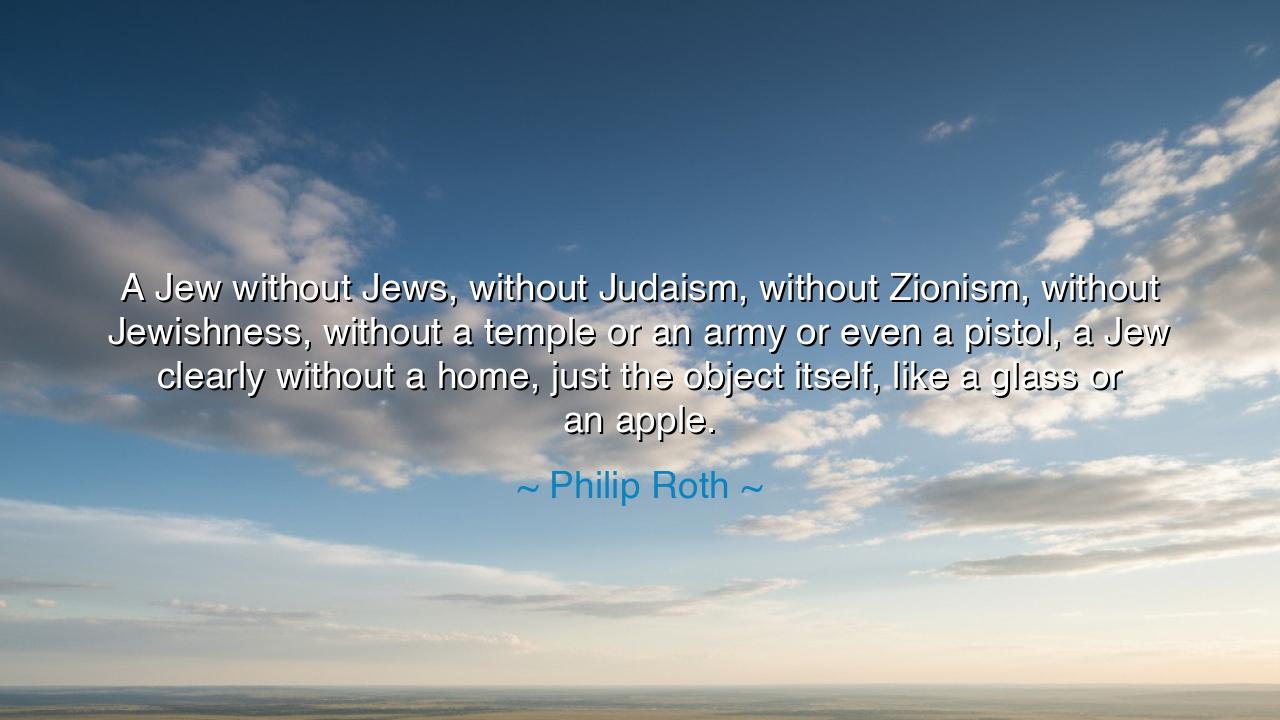
A Jew without Jews, without Judaism, without Zionism, without
A Jew without Jews, without Judaism, without Zionism, without Jewishness, without a temple or an army or even a pistol, a Jew clearly without a home, just the object itself, like a glass or an apple.






The great American novelist Philip Roth, ever the craftsman of paradox and identity, once wrote: “A Jew without Jews, without Judaism, without Zionism, without Jewishness, without a temple or an army or even a pistol, a Jew clearly without a home, just the object itself, like a glass or an apple.” In this profound and haunting reflection, Roth strips away every external layer of belonging — nation, religion, tribe, culture, defense — until what remains is the bare essence of existence, the soul of a human being standing alone before the world. His words are not just about being Jewish; they are about the universal condition of the isolated self, about what it means to exist when everything that defines you has been removed.
From the beginning of time, humanity has clung to identity as a shield against the vastness of existence. We define ourselves by our nations, our faiths, our families, and our beliefs. Roth, however, forces us to confront the terrifying question: Who are we when those things are gone? The “Jew without Jews” is a symbol of radical solitude, a man stripped not only of community but of the very language that once explained his life. Like an apple, simple and mute, or a glass, fragile yet complete, he becomes an object — no longer a citizen of history, but a pure existence in time. In this image, Roth confronts the ancient fear of exile — not merely from land, but from meaning itself.
To understand the depth of this idea, one must see it through the long memory of the Jewish experience, which has often been a story of wandering, survival, and identity in the face of displacement. For thousands of years, the Jewish people carried their nation not in borders, but in books and memory. Yet Roth, the modernist, born in America’s secular century, imagines a person beyond even that — a Jew after the collapse of identity, left to face the world with no shield but consciousness. It is both tragedy and liberation: tragedy, because it is a picture of ultimate alienation; liberation, because it reveals the human being stripped to its pure core — beyond tribe, beyond myth, beyond defense — simply being.
The origin of this quote lies in Roth’s lifelong exploration of Jewish identity in a secular world. As one of the most searching writers of the twentieth century, he sought not only to describe Jewish life in America but to question what remained when faith and belonging faded. In novels like The Counterlife and Operation Shylock, Roth wrestled with the tension between Jewishness and individuality, between tradition and freedom. This line is the culmination of that struggle — the acknowledgment that modern man, whether Jew or not, often lives like this: unanchored, cut off from collective meaning, forced to create significance out of the emptiness of his own reflection.
History has often embodied this condition. Consider Spinoza, the exiled philosopher of the seventeenth century, cast out of the Jewish community of Amsterdam for his heretical ideas. Deprived of religion, rejected by his people, he lived alone, polishing glass lenses and writing words that would shape modern thought. Spinoza was, in Roth’s terms, a Jew without Jews — without temple, without nation, without belonging — yet from that isolation, he birthed a new vision of the divine: a universe of infinite substance, where God and nature were one. His solitude became a forge of truth, showing that sometimes exile from identity is not death, but transformation.
Yet Roth’s tone is not triumph but tenderness — the awareness that such independence comes at a cost. To be “without a home,” as he writes, is to walk a path of loneliness. The apple may be whole, but it is mute; the glass may be clear, but it shatters easily. The modern person who frees themselves from the old identities — nation, religion, tribe — must learn to bear the weight of that freedom. They must build meaning from within, rather than inherit it. Roth’s image, then, is not only about the Jew but about the modern self, all who live in a time where the old gods have fallen silent and the temples of certainty have crumbled.
The lesson, my children of the future, is this: the self must become its own home. Do not fear the solitude that comes when your old identities fall away. Instead, treat it as a sacred exile — the moment when you meet the truth of who you are beneath all names. Be like the apple, simple and real; be like the glass, transparent and honest. Build your belonging not from walls or tribes, but from integrity, compassion, and awareness. In a world where nations rise and fade, where religions change and languages vanish, only the inner light endures.
Thus, Philip Roth’s words, though born from the anguish of the modern Jew, belong to all humanity. They speak of the eternal journey from dependence to selfhood, from tribe to truth. When he writes of the Jew without a home, he is describing the human being who stands naked before life — undefended, uncertain, yet still radiant with consciousness. And so his wisdom becomes ancient again: that in losing everything external, one may at last discover the bright center of the self, the home that has no walls and no end.






AAdministratorAdministrator
Welcome, honored guests. Please leave a comment, we will respond soon